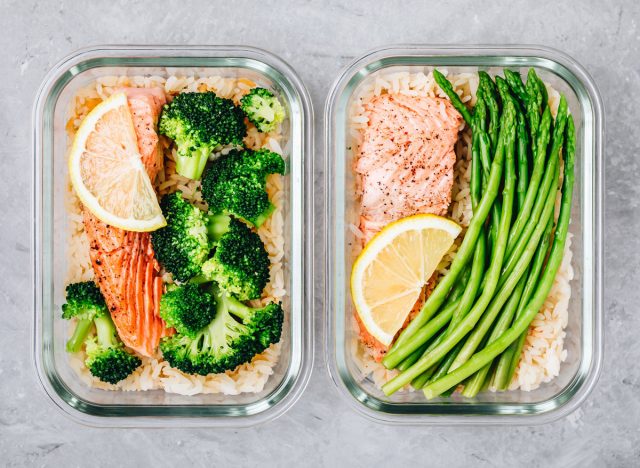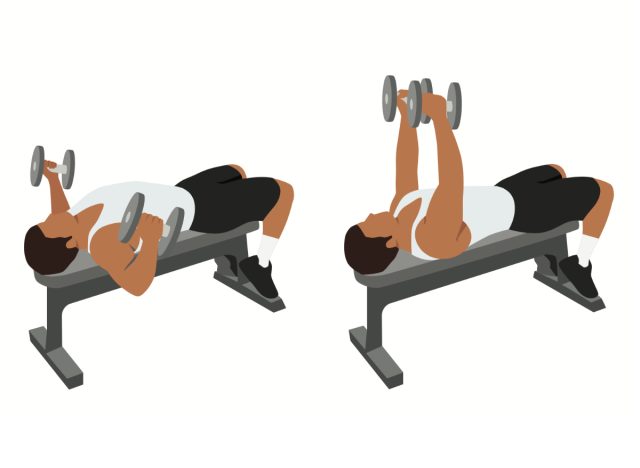5 Ways Busta Rhymes Lost 100 Pounds

Busta Rhymes is making health a priority. The hip-hop legend has lost 100 pounds and his jaw-dropping transformation was sparked by fears of health issues the 51-year-old started experiencing as a result of being overweight. "I was having all kinds of ailments happen," he said in an interview with Men's Health. "Blood pressure was becoming serious. I didn't like the way I was sounding when I was just sitting in the backseat when my driver was driving me around and I was just breathing." At his heaviest, Rhymes was 340 pounds and to drop the weight, the "BEACH BALL" artist hit the gym hard, working out two to three times a day and revamping his diet. Read on to learn five ways the rapper lost the weight and what experts think about his regime.
He Ate Lean Protein

In a 2021 interview with Men's Health, Rhymes, real name Trevor Smith Jr., explained that he overhauled his diet and included more lean protein like chicken, steak, and eggs.
What the Expert Says: "The benefits of eating lean protein include the preservation of muscle mass and the reduction of food intake," Sports performance dietitian Destini Moody, RD, CSSD, LD, says. "Protein promotes the most satiety compared to the other macronutrients, carbohydrates, and fat. Satiety means a feeling of fullness, and by including protein in each of your meals, you can stay fuller for longer, eliminating the need for extra snacks or unwelcome hunger."
Moody adds, "Protein is also critical for health reasons as it has a role in many of the body's processes, such as creating hormones, maintaining the integrity of our tissues, and the health of our skin, hair, and nails. Lean proteins like seafood and poultry are more optimal than fattier protein sources like beef and pork, as they contain more protein by weight and less saturated fat, a type of fat that is harmful to the heart when consumed regularly."
He Limited Alcohol

Rhymes enlisted the help of trainer Victor Muñoz, according to TMZ who explained how Rhymes got into amazing shape, which included limiting "booze."
What the Expert Says: "Not drinking alcohol can help someone stay thin because alcoholic beverages are often high in empty calories and can contribute to weight gain," Susan Schachter, MSRDN, and co-founder of 120/Life tells us. "Alcohol also impairs judgment and can lead to overeating or making poor food choices. By avoiding or limiting alcohol intake, individuals can reduce their calorie consumption and potentially maintain a healthier weight."
He Included Salmon in His Diet

Salmon is packed with essential nutrients like Omega 3s, which offer several health benefits like decreasing inflammation and supporting brain health. According to TMZ, the rapper's chef made meals with salmon, which is low in calories.
What the Expert Says: Dr. Praveen Guntipalli, MD, states, "Eating fish can be a fantastic addition to a healthy diet, contributing to overall fitness and well-being. Fish, especially fatty fish like salmon, mackerel, and sardines, are rich in omega-3 fatty acids, which have been widely recognized for their numerous health benefits. These essential fatty acids are known to support heart health by reducing the risk of cardiovascular diseases and lowering blood pressure. Omega-3s are also believed to aid in maintaining healthy brain function and may even help alleviate symptoms of depression and anxiety.
He adds, "Fish is an excellent source of high-quality protein necessary for muscle growth, repair, and maintenance. Unlike other animal protein sources, fish is often lean and low in saturated fat, making it a healthier choice for those aiming to maintain a balanced weight."
He Lifted Weights

Rhymes spent a lot of hours working out "training three times a day on Mondays, Wednesdays, and Fridays and two times a day on Tuesdays and Saturdays," Men's Health reports. The musician did full-body workouts that included strength training, lifting weights, and bench pressing.
What the Expert Says: "You will build muscle mass which will increase your metabolism and allow you to burn more calories at rest," Kent Probst, a personal trainer, kinesiotherapist, and bodybuilder with Long Healthy Life, says about lifting weights. "One study showed that ten weeks of resistance training can increase lean mass by 1.4 kilograms, increase resting metabolic rate by 7%, and decrease body fat by 1.8 kilograms."
He Did Incline Cable Chest Fly

Another workout Rhymes did to help get into shape was incline cable chest flys, which you can see in the Men's Health video interview.
What the Expert Says: "The incline cable chest fly is an incredible upper-body movement to help pack on strength and muscle size," USAW National Coach Jarrod Nobbe tells us. "What I love most about this movement is that you may use it as a primary strength exercise or use it in your accessory regime with those high-volume sets. Developing lean muscle mass will positively impact helping regulate and boost your metabolism, allowing you to develop the body composition goals you are striving for. Pair regular exercise with a healthy diet, and watch out!"
Nobbe adds there are several benefits to this move and explains how to get the most out of this exercise:
- Setting up this movement on the incline bench allows you to target more of your upper chest muscles than other traditional upper body push movements. Another positive benefit is that you may vary the degree of incline on the bench to target different areas. The higher the angle, the more emphasis you'll put on your pec major and minor muscles. The lower the angle, the more muscle recruitment you'll experience in the shoulders.
- The main muscles trained by this movement will be your pectoralis major and anterior deltoids. The triceps, biceps, rhomboids, and forearms will be recruited at different phases of this lift to help stabilize and support the major muscle groups.
- Always keep the weight under tension, brace, and always be in control of the movement. Often, we see people in the gym going too low with this movement when opening their arms and chest. This puts our shoulders in a risky position. Control the range of motion, and use weights that are 'just hard enough' and never too hard when implementing this exercise in your workout routine. Over time your body will adapt and become acclimated, allowing you to increase the weights being lifted."









